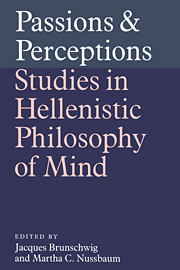Book contents
- Frontmatter
- Contents
- Preface
- Avant-propos
- Part I ETHICS AND PSYCHOLOGY OF HEDONISM
- Part II ATOMISM AND EPICUREAN PSYCHOLOGY
- Chapter 3 Epicurus on agency
- Chapter 4 Democritus and Epicurus on sensible qualities
- Part III THE PASSIONS
- Part IV STOIC PSYCHOLOGICAL CONCEPTS
- Bibliography
- Subject index
- Name index
- Index of passages cited
Chapter 4 - Democritus and Epicurus on sensible qualities
Published online by Cambridge University Press: 22 September 2009
- Frontmatter
- Contents
- Preface
- Avant-propos
- Part I ETHICS AND PSYCHOLOGY OF HEDONISM
- Part II ATOMISM AND EPICUREAN PSYCHOLOGY
- Chapter 3 Epicurus on agency
- Chapter 4 Democritus and Epicurus on sensible qualities
- Part III THE PASSIONS
- Part IV STOIC PSYCHOLOGICAL CONCEPTS
- Bibliography
- Subject index
- Name index
- Index of passages cited
Summary
The puzzle that provoked this study lies in the apparent difference between Democritus and Epicurus about the value of sense-perception. Epicurus took over the atomic theory from Democritus; he gave the same account, in essence, of the mechanics of sense-perception. Yet Democritus is said by many sources to have been sceptical about the ability of the senses to reveal truth, whereas Epicurus is said to have declared that ‘all aisthēta are true’.
It happens that we have two lengthy criticisms of the Atomists' theory of qualities from the point of view of the Peripatos and the Academy: I mean the long fragment of Theophrastus' book On the Senses, and Plutarch's essay Against Colotes, with its sequel, On the Impossibility of a Pleasant Epicurean Life. What should give these two an exceptional value as historical documents is that the first was written before the author knew anything about the philosophy of Epicurus, or at least at a time when he could take notice only of Democritus among the Atomists, whereas Plutarch aims to criticize the Epicurean Colotes precisely for his misunderstandings and mistreatments of Democritus, as well as for the inadequacies of his own Epicurean theory. A study of the criticisms of Theophrastus and Plutarch might perhaps give us a better understanding of the differences between Democritus and Epicurus, and the reasons for the differences we find.
Both authors criticize the position of the Atomists from the stand-point of the theory they themselves subscribe to.
- Type
- Chapter
- Information
- Passions and PerceptionsStudies in Hellenistic Philosophy of Mind, pp. 72 - 94Publisher: Cambridge University PressPrint publication year: 1993
- 1
- Cited by



